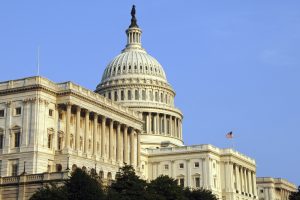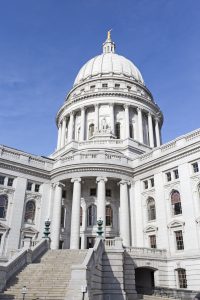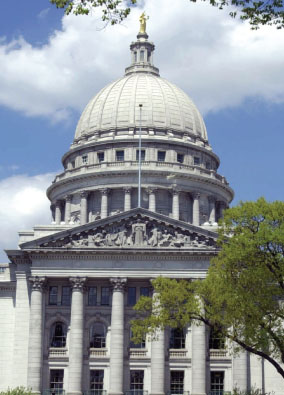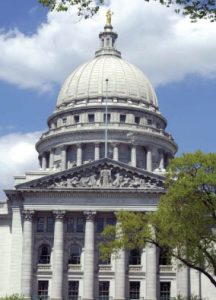by Dan Rossmiller | Aug 31, 2020 | Federal Budget, Federal Issue, Legislative Update Blog
 USDA Extends Certain Federal School Meal Plan Waivers Through Dec. 31
USDA Extends Certain Federal School Meal Plan Waivers Through Dec. 31
Today (8/31), the U.S. Department of Agriculture (USDA) announced it will extend certain federal school meal waivers that had been extended through August 2020 until the end of the current calendar year. According to the USDA, the move means summer meal programs can continue operating as funding allows. Preliminary news reports indicate this will permit schools to offer food to all kids, regardless of income or enrollment, through the end of 2020 “as funding allows.” Among other things, the waivers announced today extend meal pattern waivers, congregate meal waivers and meal time waivers and allow parents to continue to pick up meals on weekdays and weekends from schools or other designated sites rather than only at schools. (more…)
by Dan Rossmiller | Aug 31, 2020 | Legislative Update Blog, State Issue
 Good News on State Finances
Good News on State Finances
For weeks, Capitol sources have suggested that updated estimates of state revenues that would take into account the impact of the COVID pandemic might be available by mid-to late-August. Those estimates of the state’s fiscal condition were released Aug 31. For more information, see a separate blog post on this topic.
Special Session and Other Related News
Lawmakers met briefly in a skeleton session format Aug 31 to begin a special legislative session called by Gov. Tony Evers to address police reform measures amid ongoing tensions in Kenosha over the police shooting of Jacob Blake. No action on any bills was taken. (more…)

by Chris Kulow | Aug 31, 2020 | Legislative Update Blog, State Budget
 The non-partisan Legislative Fiscal Bureau (LFB) has provided the much-anticipated look at state tax collections for fiscal year 2019-20, which ended June 30, 2020 (also known as the first year of the current biennial budget). The LFB memo, released today (8/31), states that tax collections were actually up 1.1% over the previous year but still below earlier estimates by 0.6%. This is welcome news and may lessen the need for a budget repair bill this fall.
The non-partisan Legislative Fiscal Bureau (LFB) has provided the much-anticipated look at state tax collections for fiscal year 2019-20, which ended June 30, 2020 (also known as the first year of the current biennial budget). The LFB memo, released today (8/31), states that tax collections were actually up 1.1% over the previous year but still below earlier estimates by 0.6%. This is welcome news and may lessen the need for a budget repair bill this fall.
The increase in tax collections means the state was also able to make an additional deposit in the state’s rainy day fund of $105.9 million which will be helpful in what still appears to be an even more challenging fiscal year 2020-21. The second year of the current state budget, which started July 1, 2020, includes the bulk of funding increases for schools and other programs that were provided in the state’s two-year spending plan.
The LFB memo does not include estimates for fiscal year 2020-21 because, as a practice, the LFB does not publish early estimates in election years.
See the LFB memo here. The state Department of Revenue also released numbers here.

by Chris Kulow | Aug 28, 2020 | Legislative Update Blog, WASB
 We want to remind member boards that the September 15 deadline for submitting a resolution to the WASB for consideration to become an official policy or position for the Association is quickly approaching. Before a resolution can be submitted, it must be officially voted on and approved by your board.
We want to remind member boards that the September 15 deadline for submitting a resolution to the WASB for consideration to become an official policy or position for the Association is quickly approaching. Before a resolution can be submitted, it must be officially voted on and approved by your board.
To submit your resolutions to the WASB, you can use the following new and improved form: 2021 Resolutions Submission Form
Here’s a refresher on how the WASB resolution process works and why it is important: (more…)
by Dan Rossmiller | Aug 25, 2020 | Federal Budget, Federal Issue, Legislative Update Blog, State Budget, State Issue
 State Rep. John Nygren, co-chair of the Legislature’s powerful, budget-writing Joint Committee on Finance, appeared this morning on a Zoom webinar sponsored by the Badger Institute to address the state’s fiscal condition. It was the most candid look at state finances we have had in a long time.
State Rep. John Nygren, co-chair of the Legislature’s powerful, budget-writing Joint Committee on Finance, appeared this morning on a Zoom webinar sponsored by the Badger Institute to address the state’s fiscal condition. It was the most candid look at state finances we have had in a long time.
While Rep. Nygren indicated that state revenues have stabilized and the fiscal reality is better than he would have thought likely when the pandemic began back in March, the veteran Marinette Republican emphasized that most of the negative impact on state revenues due to the COVID-19 pandemic will be felt in the second year of the current 2019-21 biennium.
Rep. Nygren repeatedly noted that any decisions that can be made now to reduce spending in the second year of the current two-year state budget will make the next biennial budget easier so lawmakers will not have to make cuts (or such big cuts).
Addressing his comments at one point specifically to school leaders, the longtime JFC chair said, “My advice to schools is to reduce expenditures in the current school year so that you have cash on hand… so you have some cushion going into the next budget.”
(more…)
 USDA Extends Certain Federal School Meal Plan Waivers Through Dec. 31
USDA Extends Certain Federal School Meal Plan Waivers Through Dec. 31 Good News on State Finances
Good News on State Finances
 The non-partisan Legislative Fiscal Bureau (LFB) has provided the much-anticipated look at state tax collections for fiscal year 2019-20, which ended June 30, 2020 (also known as the first year of the current biennial budget). The LFB memo, released today (8/31), states that tax collections were actually up 1.1% over the previous year but still below earlier estimates by 0.6%. This is welcome news and may lessen the need for a budget repair bill this fall.
The non-partisan Legislative Fiscal Bureau (LFB) has provided the much-anticipated look at state tax collections for fiscal year 2019-20, which ended June 30, 2020 (also known as the first year of the current biennial budget). The LFB memo, released today (8/31), states that tax collections were actually up 1.1% over the previous year but still below earlier estimates by 0.6%. This is welcome news and may lessen the need for a budget repair bill this fall.
 We want to remind member boards that the September 15 deadline for submitting a resolution to the WASB for consideration to become an official policy or position for the Association is quickly approaching. Before a resolution can be submitted, it must be officially voted on and approved by your board.
We want to remind member boards that the September 15 deadline for submitting a resolution to the WASB for consideration to become an official policy or position for the Association is quickly approaching. Before a resolution can be submitted, it must be officially voted on and approved by your board. State Rep. John Nygren, co-chair of the Legislature’s powerful, budget-writing Joint Committee on Finance, appeared this morning on a
State Rep. John Nygren, co-chair of the Legislature’s powerful, budget-writing Joint Committee on Finance, appeared this morning on a